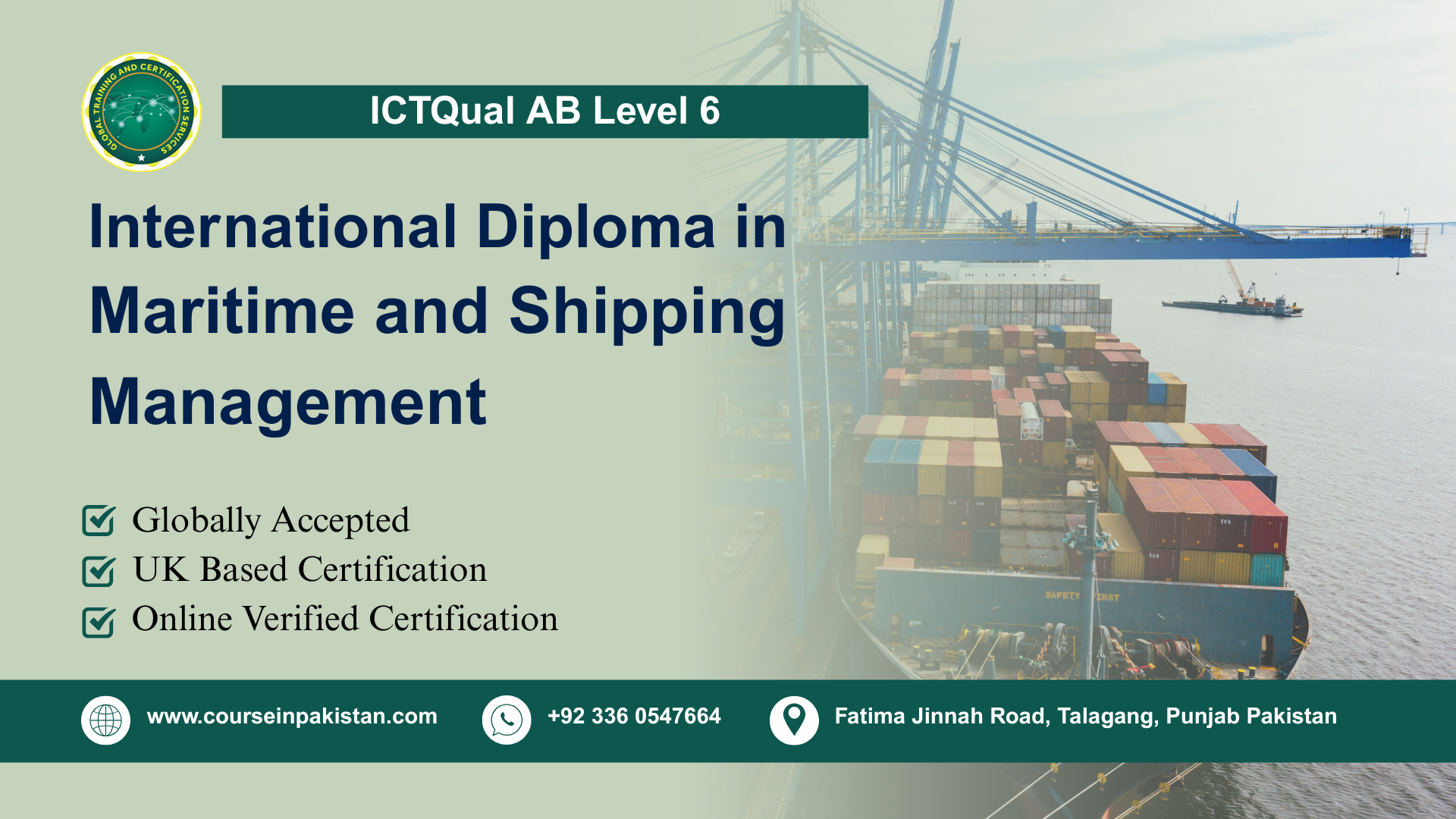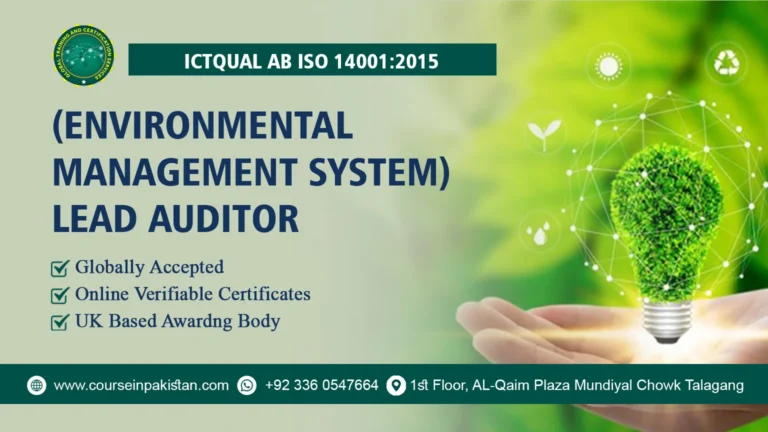
The maritime and shipping industry is the backbone of global trade, responsible for transporting goods and raw materials across continents. With increasing international trade, sustainability concerns, and the rise of advanced shipping technologies, the demand for highly skilled professionals in maritime and shipping management has never been greater. The ICTQual AB Level 6 International Diploma in Maritime and Shipping Management has been designed to equip learners with in-depth knowledge and practical skills to thrive in this competitive sector.
This program covers all critical aspects of maritime operations, including shipping logistics, port and terminal management, maritime law, safety, risk management, and international shipping regulations. Learners will gain a blend of theoretical understanding and industry-focused insights to prepare them for global career opportunities. Whether starting in the field or advancing an existing career, this diploma builds expertise that aligns with international industry standards.
Course Overview
The ICTQual AB Level 6 International Diploma in Maritime and Shipping Management is a 360-credit qualification designed to meet the needs of both fresh students and experienced professionals. This flexible and fully assignment-based program can be completed at one’s own pace from anywhere in the world, making it highly accessible for global learners. The certification is British Council verifiable, MOFA and Embassy attestable, and highly valued for job opportunities and Iqama approval.
Fresh candidates are required to complete all 36 mandatory assignments within 3 years, ensuring they gain a strong foundation and advanced knowledge of maritime and shipping management. For experienced and competent individuals, there is an alternate pathway: candidates with a minimum of 6 years of verifiable relevant experience can achieve the certification by defending their knowledge in professional discussion meetings with an ICTQual AB approved assessor, allowing them to earn the qualification in a shorter time without completing all assignments. This dual pathway ensures flexibility, relevance, and recognition of prior learning, making it a globally competitive diploma for career growth.
Key Highlights of the Course:
- 360-credit international diploma, fully assignment-based and self-paced
- British Council verifiable, MOFA and Embassy attestable qualification
- Flexible study options suitable for both fresh learners and experienced professionals
- Recognised globally for job opportunities, career advancement, and Iqama approval
- Focused on maritime operations, shipping logistics, and international regulations
Course Benefits
Global Career Opportunities
- Access high-demand roles in ports, shipping companies, logistics firms, and international trade organisations.
- Enhance employability for positions such as Shipping Manager, Port Operations Supervisor, or Maritime Logistics Coordinator.
Flexible Learning Pathways
- Complete the diploma at your own pace with assignment-based learning.
- Recognition of prior experience allows professionals to fast-track their qualification.
International Recognition
- Qualification is British Council verifiable and MOFA & Embassy attestable, ensuring global acceptance.
- Ideal for career mobility across international maritime hubs and shipping companies.
Industry-Relevant Knowledge
- Gain expertise in maritime law, safety management, shipping operations, and sustainability practices.
- Learn advanced strategies in port management, supply chain integration, and global shipping logistics.
Enhanced Professional Growth
- Strengthen leadership, decision-making, and management skills in maritime contexts.
- Prepare for future career advancement or postgraduate study in maritime management, shipping, or logistics.
Course Study Units
This qualification, the ICTQual AB Level 6 International Diploma in Maritime & Shipping Management, consists of 36 mandatory units.
Year 1 – Foundations of Maritime & Shipping Management
- Introduction to Maritime & Shipping Industry
- Principles of Shipping Operations
- International Trade and Logistics Fundamentals
- Maritime Law and Regulatory Frameworks
- Port Operations and Management Basics
- Ship Types, Classification, and Vessel Management
- Maritime Safety and Security Principles
- Environmental Sustainability in Shipping
- Supply Chain and Transport Management
- Principles of Risk Management in Maritime Operations
- Introduction to Maritime Economics
- Professional Ethics and Communication in Shipping
Year 2 – Applied Maritime Operations & Management
- Advanced Shipping Operations and Planning
- Vessel Chartering and Freight Management
- Maritime Logistics and Supply Chain Integration
- Port Management and Terminal Operations
- Maritime Insurance and Risk Mitigation
- Crisis Management and Emergency Response in Shipping
- Shipping Finance and Budgeting
- Environmental Compliance and Marine Pollution Control
- Technology and Digitalisation in Maritime Industry
- Project Management in Maritime Operations
- Human Resource Management in Shipping Organisations
- Applied Case Studies and Operational Simulations
Year 3 – Strategic Leadership & Advanced Maritime Management
- Strategic Management in Maritime & Shipping Industry
- International Maritime Policies and Governance
- Maritime Trade Law and Contract Management
- Leadership and Decision-Making in Shipping Operations
- Advanced Risk and Safety Management in Maritime Sector
- Port and Terminal Strategic Planning
- Global Supply Chain Management for Maritime Trade
- Innovation and Emerging Technologies in Shipping
- Sustainability and Climate Change Adaptation in Shipping
- Research Methods for Maritime Management
- Independent Research Project in Maritime & Shipping Management
- Capstone Project: Applied Maritime & Shipping Strategy
Learning Outcomes
Year 1 – Foundations of Maritime & Shipping Management
Introduction to Maritime & Shipping Industry
- Understand the historical development and global significance of the maritime and shipping industry
- Recognize major stakeholders and sectors within shipping
- Explain the role of shipping in international trade and economic growth
- Identify emerging challenges and opportunities
Principles of Shipping Operations
- Demonstrate knowledge of core shipping operations
- Explain cargo handling, documentation, and shipping procedures
- Analyse operational efficiency and cost impact
- Apply operational principles for industry compliance
International Trade and Logistics Fundamentals
- Understand the link between international trade and shipping logistics
- Explain trade terms, agreements, and Incoterms
- Analyse logistics strategies for cost-effective transport
- Apply trade and logistics knowledge to real scenarios
Maritime Law and Regulatory Frameworks
- Understand international maritime laws, conventions, and treaties
- Identify roles of IMO, flag states, and port states
- Apply legal frameworks to shipping operations and disputes
- Analyse the impact of maritime law on trade
Port Operations and Management Basics
- Demonstrate knowledge of port structures and functions
- Explain cargo handling, storage, and operational processes
- Analyse productivity and efficiency measures
- Recognize challenges in port logistics and supply chain coordination
Ship Types, Classification, and Vessel Management
- Identify and classify vessels based on cargo and function
- Understand classification societies and certifications
- Explain vessel management and maintenance principles
- Analyse operational suitability of ships
Maritime Safety and Security Principles
- Understand international safety and security conventions
- Apply risk assessment for vessel and crew safety
- Recognize threats like piracy and smuggling
- Demonstrate knowledge of emergency procedures
Environmental Sustainability in Shipping
- Understand environmental impacts of shipping
- Explain MARPOL and other pollution prevention regulations
- Analyse carbon emission reduction strategies
- Apply sustainability practices in operations
Supply Chain and Transport Management
- Explain fundamentals of supply chain networks in shipping
- Analyse modes of transport and integration in logistics
- Understand roles of ports and shipping lines
- Apply transport management principles for efficiency
Principles of Risk Management in Maritime Operations
- Understand risk identification, assessment, and mitigation
- Apply risk management frameworks to operations
- Recognize key operational, financial, and environmental risks
- Develop strategies to minimize risks
Introduction to Maritime Economics
- Understand supply and demand principles in shipping markets
- Analyse freight rates, cycles, and market dynamics
- Recognize economics’ role in fleet management
- Apply economic principles to decision-making
Professional Ethics and Communication in Shipping
- Understand ethical issues in maritime business
- Apply integrity and compliance in operations
- Demonstrate effective communication in multicultural environments
- Develop teamwork and interpersonal skills
Year 2 – Applied Maritime Operations & Management
Advanced Shipping Operations and Planning
- Apply advanced shipping operations principles
- Understand voyage planning and route optimization
- Analyse operational impact on costs and efficiency
- Develop solutions for operational challenges
Vessel Chartering and Freight Management
- Understand vessel chartering principles and freight contracts
- Analyse types of charter agreements
- Apply freight management strategies for profitability
- Evaluate risks and benefits of charter arrangements
Maritime Logistics and Supply Chain Integration
- Understand integration of maritime transport in global supply chains
- Apply logistics models for efficiency improvement
- Analyse supply chain disruptions and resilience strategies
- Demonstrate end-to-end supply chain management knowledge
Port Management and Terminal Operations
- Understand terminal operations, equipment, and resource allocation
- Apply principles of port planning and capacity optimization
- Recognize challenges in container and bulk terminal management
- Analyse roles of port authorities and private operators
Maritime Insurance and Risk Mitigation
- Understand types of maritime insurance
- Analyse risk exposure and insurance strategies
- Apply claims handling and dispute resolution principles
- Evaluate insurance’s role in reducing operational risks
Crisis Management and Emergency Response in Shipping
- Understand crisis management principles
- Develop emergency preparedness and response plans
- Analyse maritime accident case studies
- Apply decision-making strategies in crises
Shipping Finance and Budgeting
- Understand financial structures and funding
- Analyse shipping investment strategies
- Apply budgeting principles to expenditures
- Evaluate financial performance through reporting tools
Environmental Compliance and Marine Pollution Control
- Understand environmental regulations in shipping
- Apply compliance strategies to prevent pollution
- Analyse sustainable technologies and practices
- Evaluate economic impact of compliance
Technology and Digitalisation in Maritime Industry
- Understand digitalisation in shipping operations
- Apply technologies like blockchain, IoT, AI
- Analyse benefits and risks of digital transformation
- Evaluate case studies of technological adoption
Project Management in Maritime Operations
- Apply project management frameworks
- Understand planning, execution, and monitoring
- Analyse risks and success factors in projects
- Develop project documentation and reports
Human Resource Management in Shipping Organisations
- Understand HRM principles in maritime contexts
- Apply recruitment, training, and retention strategies
- Analyse crew management and welfare challenges
- Evaluate HR policies for workforce effectiveness
Applied Case Studies and Operational Simulations
- Apply theoretical knowledge to practical scenarios
- Analyse real-world case studies
- Demonstrate problem-solving in simulations
- Evaluate operational outcomes
Year 3 – Strategic Leadership & Advanced Maritime Management
Strategic Management in Maritime & Shipping Industry
- Understand strategic planning processes
- Apply competitive analysis tools
- Evaluate strategic decisions for fleet and port management
- Develop long-term growth strategies
International Maritime Policies and Governance
- Understand global governance in maritime trade
- Analyse IMO and governing bodies’ roles
- Apply policies to shipping and port operations
- Evaluate governance effectiveness in sustainability
Maritime Trade Law and Contract Management
- Understand maritime contracts and trade law
- Apply legal frameworks to contract drafting and interpretation
- Analyse dispute resolution methods
- Evaluate contract breach risks
Leadership and Decision-Making in Shipping Operations
- Demonstrate effective leadership skills
- Apply decision-making frameworks
- Analyse leadership styles and organizational impact
- Develop ethical and inclusive leadership strategies
Advanced Risk and Safety Management in Maritime Sector
- Understand advanced safety management systems
- Apply proactive risk identification and control
- Analyse maritime disaster case studies
- Develop comprehensive safety management frameworks
Port and Terminal Strategic Planning
- Understand long-term port development principles
- Apply strategic frameworks to capacity and expansion projects
- Analyse economic, environmental, and political factors
- Evaluate strategies for global competitiveness
Global Supply Chain Management for Maritime Trade
- Understand complex global supply chains
- Apply strategies to optimize maritime transport
- Analyse supply chain disruption risks
- Evaluate shipping line roles in global supply chains
Innovation and Emerging Technologies in Shipping
- Understand impact of emerging technologies
- Apply innovative solutions for efficiency and sustainability
- Analyse technology-driven transformation case studies
- Evaluate adoption challenges
Sustainability and Climate Change Adaptation in Shipping
- Understand climate change implications on shipping
- Apply strategies for emissions reduction and adaptation
- Analyse international climate policies
- Evaluate sustainable practices in maritime business
Research Methods for Maritime Management
- Understand research methodologies for maritime studies
- Apply qualitative and quantitative research tools
- Analyse data for evidence-based decisions
- Develop a research proposal
Independent Research Project in Maritime & Shipping Management
- Define and scope an independent research problem
- Apply research methods to collect and analyse data
- Demonstrate critical thinking and academic writing
- Present findings and recommendations
Capstone Project: Applied Maritime & Shipping Strategy
- Integrate knowledge from across the programme
- Apply strategic frameworks to real-world challenges
- Demonstrate leadership, planning, and execution skills
- Present innovative, sustainable, and practical solutions
Who is This Course For?
1. Aspiring Maritime Professionals
- Individuals looking to start a career in shipping, ports, or logistics
- Students aiming to understand the fundamentals of maritime operations and management
- Fresh graduates seeking a globally recognized qualification to enhance employability
2. Experienced Industry Professionals
- Shipping, logistics, and supply chain professionals aiming to upgrade their skills
- Port and terminal managers seeking advanced operational and strategic knowledge
- Professionals in maritime safety, insurance, or finance looking for career progression
3. Independent and Self-Motivated Learners
- Learners who prefer a self-paced, flexible study approach
- Individuals comfortable completing assignments independently from anywhere in the world
- Professionals balancing work, study, and personal commitments
4. Future Leaders and Managers
- Learners aspiring for leadership or senior management roles in maritime organizations
- Individuals aiming to develop strategic decision-making, risk management, and operational planning skills
- Professionals seeking to gain expertise in project management, innovation, and sustainability in shipping
5. Global Career Seekers
- Individuals seeking internationally recognized qualifications verified by the British Council
- Learners targeting MOFA and embassy attestations for career or visa purposes
- Professionals looking to enhance credibility for international job placements and iqama approval
6. Academically Ambitious Learners
- Individuals intending to pursue further academic pathways such as postgraduate studies in maritime, logistics, or shipping management
- Learners seeking strong research, analytical, and problem-solving skills applicable to the maritime sector
Future Progression
Completing this qualification can open opportunities such as:
- Senior management positions in shipping companies, ports, and logistics firms
- Roles in maritime consultancy, risk management, and operations planning
- Leadership positions in international trade and transport organisations
- Opportunities to pursue research or consultancy projects in maritime management
- Pathways to further postgraduate studies in shipping, logistics, or maritime management
Academic Pathways:
- This qualification provides a foundation for:
- Progression to professional diplomas or advanced certifications in maritime, logistics, or transport management
- Enrollment in postgraduate studies such as a Master’s in Maritime Management, Shipping, or Supply Chain Management
- Specialisation courses in port management, maritime law, or shipping finance
- Executive development programs in strategic maritime leadership
Conclusion
The ICTQual AB Level 6 International Diploma in Maritime & Shipping Management is a comprehensive, globally recognised qualification designed for ambitious learners aiming to excel in the maritime and shipping sectors. Fully assignment-based and flexible, it allows students to study at their own pace from anywhere in the world. With British Council verification, MOFA and embassy attestation, and strong career relevance, this diploma equips learners with practical, strategic, and leadership skills essential for high-level roles in shipping, port operations, logistics, and international trade.






